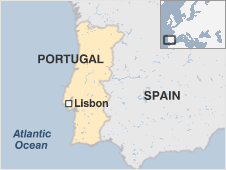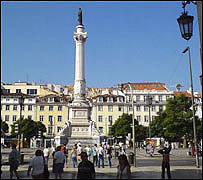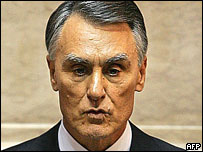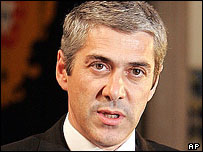 |
Portugal a country with a rich history of seafaring and discovery looks out from the Iberian peninsula into the Atlantic Ocean.
When it handed over its last overseas territory Macau to Chinese administration in 1999 it brought to an end a long and sometimes turbulent era as a colonial power.
Overview
The roots of that era stretch back to the 15th century when Portuguese explorers such as Vasco da Gama put to sea in search of a passage to India. By the 16th century these sailors had helped build a huge empire embracing Brazil as well as swathes of Africa and Asia. There are still some 200 million Portuguese speakers around the world today.

Lisbon's Rossio Square a popular meeting place
|
Portugal's history has had a lasting impact on the culture of the country with Moorish and Oriental influences in architecture and the arts. Traditional folk dance and music particularly the melancholy fado remain vibrant.
For almost half of the 20th century Portugal was a dictatorship in which for decades Antonio de Oliveira Salazar was the key figure. The dictatorship's stubborn refusal to relinquish its grip on the former colonies as demands for independence gained momentum there resulted in expensive wars in Africa.
This period was brought to an end in 1974 in a bloodless coup picturesquely known as the Revolution of the Carnations which ushered in a new democracy.
By the end of 1975 all of Portugal's former colonies in Africa were independent of Lisbon.
Facts
- Full name: Portuguese Republic
- Population: 10.7 million (UN 2009)
- Capital: Lisbon
- Area: 92345 sq km (35655 sq miles)
- Major language: Portuguese
- Major religion: Christianity
- Life expectancy: 75 years (men) 82 years (women) (UN)
- Monetary unit: 1 euro = 100 cents
- Main exports: Textiles and clothing wood products electrical equipment
- GNI per capita: US $20560 (World Bank 2008)
- Internet domain: .pt
- International dialling code: +351
Leaders
President: Anibal Cavaco Silva

Anibal Cavaco Silva centre-right president
|
Anibal Cavaco Silva won the January 2006 presidential poll becoming the first centre-right president since the coup of 1974. He defeated two Socialist candidates to win a first round election victory.
The president's role is mainly ceremonial but incumbents can appoint prime ministers dissolve parliament and call elections.
Prime minister: Jose Socrates
Jose Socrates whose governing Socialist Party came to power in 2005 led his party to another election victory in September 2009.
The party however lost its overall majority. Final results from the general election gave the Socialists 36% the vote seven points ahead of the centre-right Social Democrats.
Following talks with other political parties Mr Socrates decided in October to form a minority government and to negotiate support for changes in legislation on a case-by-case basis.
Ruling in a minority is likely to present a tough challenge as Portugal needs to swiftly address problems such as rising debt and unemployment a growing budget deficit

and a widening wealth gap with its European partners.
In the 2005 elections the Socialists gained their first absolute majority in parliament since democracy returned to Portugal in 1974.
On taking office then Mr Socrates - who had led the Socialists since 2004 - said his priority would be to revive the economy and stem rising unemployment.
His first government sharply cut spending by reducing pensions raising the retirement age and withdrawing civil service benefits in an attempt to reduce one of Europe's biggest budget deficits.
|
Jose Socrates formed his second government in 2009 |
Despite the tough economic medicine administered by Mr Socrates during
his first term in office Portugal is still Western Europe's poorest country.
Media
Portugal's commercial TV stations command a lion's share of the viewing audience and provide tough competition for the cash-strapped public broadcaster.
Public TV services are operated by RTP which enjoyed a monopoly on the airwaves until the launch of commercial channel SIC in 1992.
Multichannel TV - via cable satellite and recently-introduced digital terrestrial - reaches more than two million homes. Cable is the dominant platform.
Public radio networks are operated by RDP. The Roman Catholic Church owns the widely-listened-to Radio Renascenca. There are some 300 local and regional commercial radio stations.
The press
- Diario de Noticias - daily
- Publico - daily
- Correio da Manha - daily
- Jornal de Noticias - daily
- Expresso - weekly
- The Portugal News - English-language weekly
- The Resident - English-language weekly
- Get Real Weekly - English-language
Television
- RTP - public operates two domestic channels and external services RTP Africa and RTP Internacional
- SIC - commercial channels include cable news station SIC Noticias
- TVI - commercial
- TV Cabo - main pay-TV operator
Radio
- RDP - public operates national networks regional and external services
- Radio Comercial - national commercial
- TSF - national commercial
- Radio Clube Portugues - commercial network
- Radio Renascenca - church-run
News agency
-
Lusa News Agency
AFRICA | ASIA-PACIFIC | AMERICAS | EUROPE | MIDDLEEAST | SOUTHASIA
Mauritania Mauritius Morocco Mozambique Namibia Niger Nigeria Republic-of-congo Rwanda Sao-tome-and-principe Senegal Seychelles Sierra-leone Somalia South-africa Sudan Swaziland Tanzania The-gambia Togo Tunisia Uganda zambia Zimbabwe Australia Brunei Burma Cambodia China East-timor Fiji Indonesia Japan Kazakhstan Kiribati Kyrgyzstan Laos Malaysia Marshall-islands Micronesia Mongolia Nauru New-zealand North-korea Palau Papua-new-guinea Samoa Singapore Solomon-islands South-korea Taiwan Tajikistan Thailand The-philippines Tonga Turkmenistan Tuvalu Uzbekistan Vanuatu Vietnam Antigua-and-barbuda Argentina Bahamas Barbados Belize Bolivia Brazil Canada Chile Colombia Costa-rica Cuba Dominica Dominican-republic Ecuador El-salvador Grenada Guatemala GuyanaHaiti Honduras Jamaica Mexico Nicaragua Panama Paraguay Peru St-kitts-and-nevis St-lucia St-vincent-and-the-grenadines Suriname Trinidad-and-tobago United-states-of-america Uruguay Venezuela Albania Andorra Armenia Austria Azerbaijan Belarus Belgium Bosnia-hercegovina Bulgaria Croatia Cyprus Czech-republic Denmark Estonia Finland France Georgia Germany Greece Hungary Iceland Ireland Italy Latvia Liechtenstein Lithuania Luxembourg Macedonia Malta Moldova Monaco Montenegro Norway Poland Portugal Russia San-marino Serbia Slovakia Slovenia Spain Sweden Switzerland The-netherlands Turkey Ukraine United-kingdom Vatican Algeria Egypt Iran Iraq Israel-and-palestinian-territories Jordan Kuwait Lebanon Libya Mauritania Oman Saudi-arabia Sudan Syria Tunisia United-arab-emirates Yemen Afghanistan Bangladesh Bhutan India Nepal Pakistan Sri-Lanka The-Maldives

